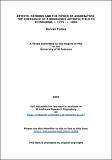Artists, patrons and the power of association : the emergence of a bourgeois artistic field in Edinburgh, c.1775-c.1840
Abstract
The period 1775 - 1840 witnessed a dramatic transformation in
the size and complexity of the Edinburgh art world, with the
rituals associated with fine art consumption emerging from the
closed circles of the elite connoisseur and taking on new
meanings in the more open and contested spaces of the urban
public sphere. Expanding regimes of artistic exchange and
consumption accelerated rapidly during the course of the 1820s,
as the city's fine arts became more deeply embedded in British
and Continental markets. For a growing audience of wealthy
professional bourgeoisie and lesser gentry, the ownership of
painting became the requisite component of refined urban
living.
However, this expansion -- dominated by the resale
exchange of 'old' masters -- was not automatically a boon to
contemporary artists. In a highly stratified artistic sphere
many found the struggle for subsistence unequal. An early
protective association, the Society of Artists, foundered on
the rocks of its members' competing interests, and the
formation of the Scottish Academy in 1826 was also riven by
debilitating disputes between different groups of artists and
their patrons. During a period of acute political turmoil, the
press exploited these divisions for political gain, and disagreements
over modes of patronage were easily represented in
terms of the passions of party feeling.
It was only in the wake of the Reform Act, and the
remodelling of Edinburgh's body politic, that the 'problem' of
the public emerged as a central concern of elite patronage.
Members of the stumbling Scottish Academy joined with leading
civic figures to found the first Edinburgh art union. Its
successful harnessing of a largely middle-class public not only
secured the financial prospects of the city's leading artists,
but also offered civic elites a clearly defined pathway to
social power and recognition. The cultural authority accruing
to the fine arts allowed its managers to develop a self-interested
'governmental' agenda. However, the art union's
dominance of the urban arts did not pass uncontested, and a
counter organisation was formed to challenge its patrician
management style. These disputes, combined with earlier
confrontations, expose the complex array of competing interests
that structured Edinburgh's emergent artistic field during the
early decades of the nineteenth century.
Type
Thesis, PhD Doctor of Philosophy
Collections
Items in the St Andrews Research Repository are protected by copyright, with all rights reserved, unless otherwise indicated.

